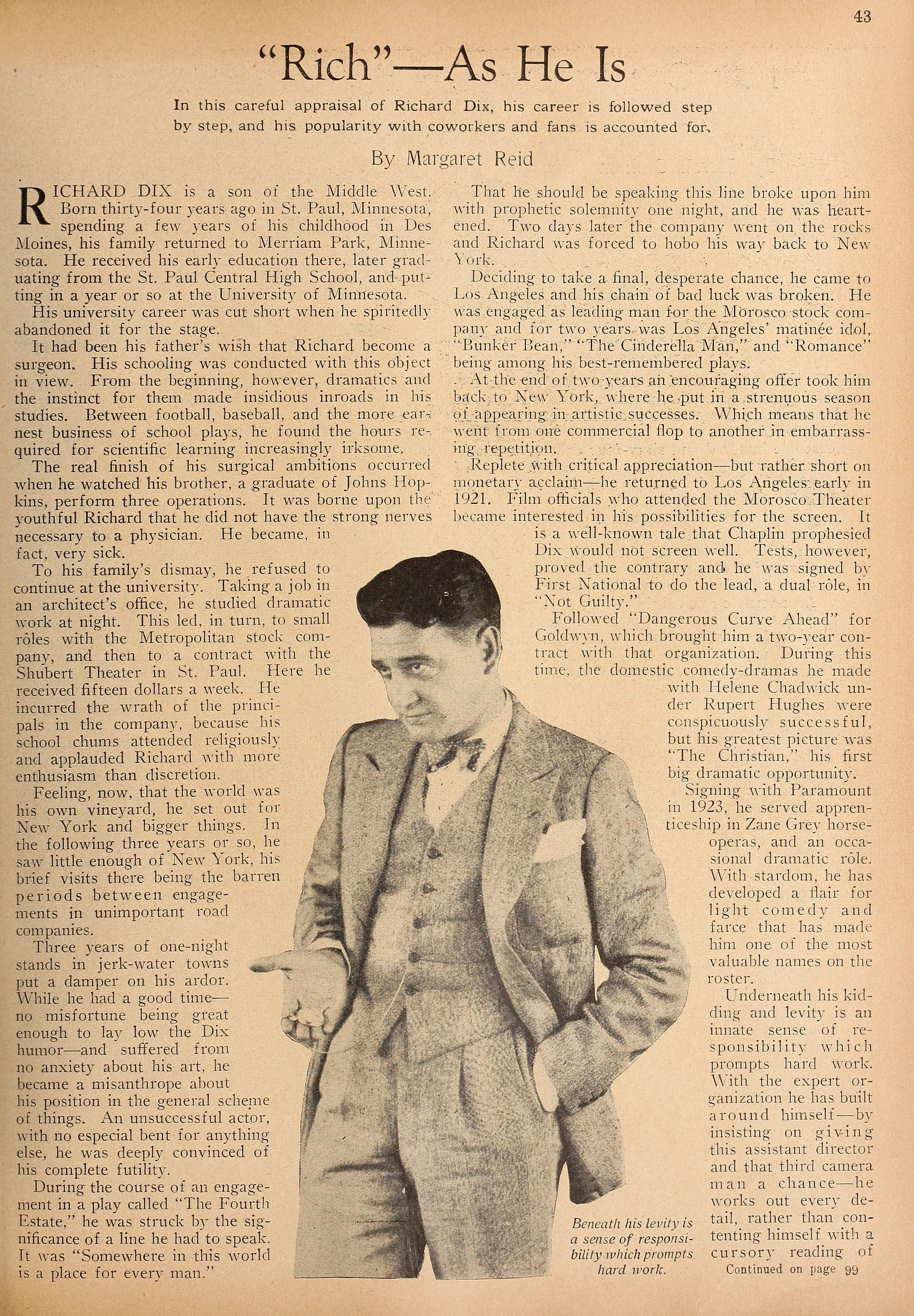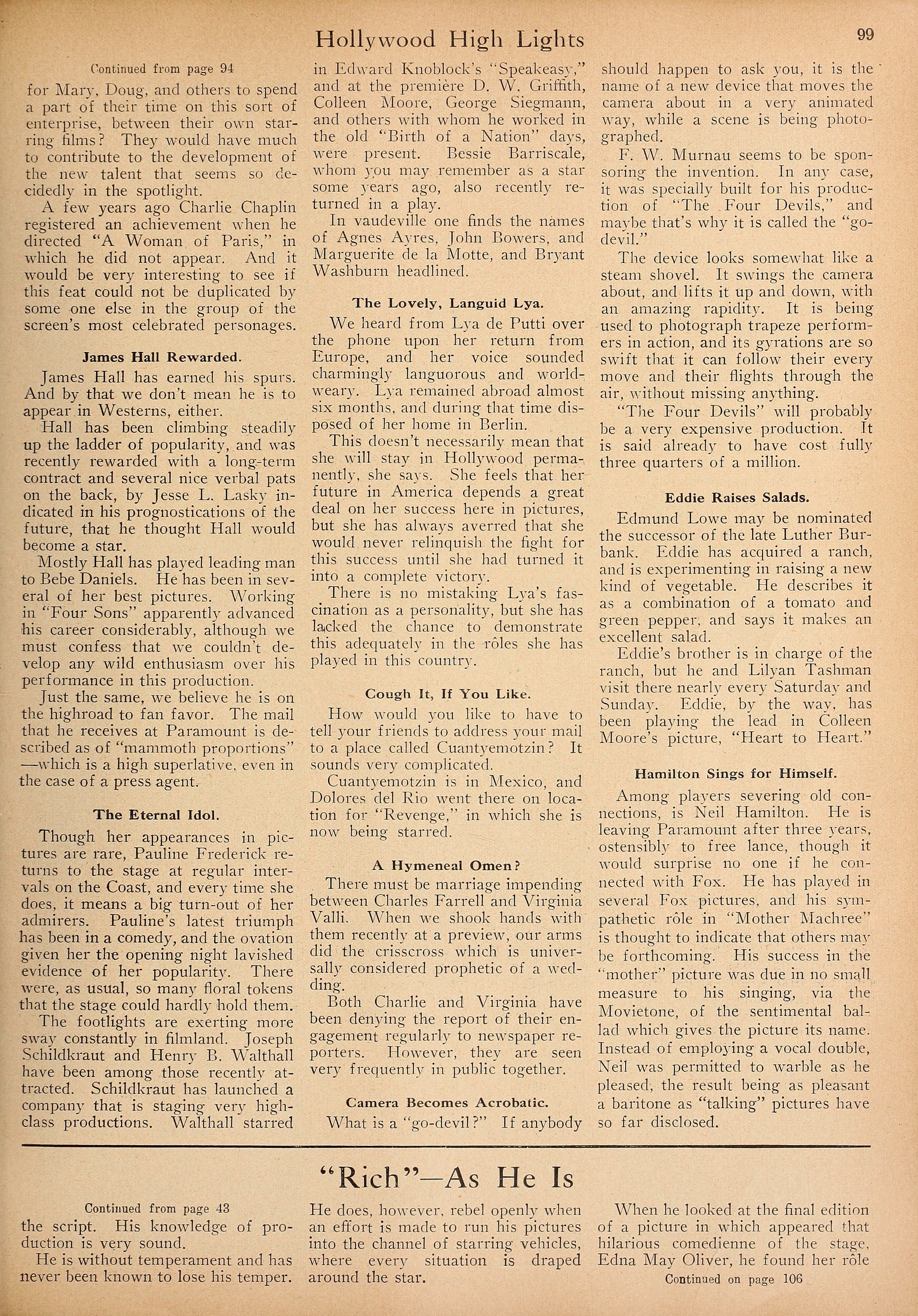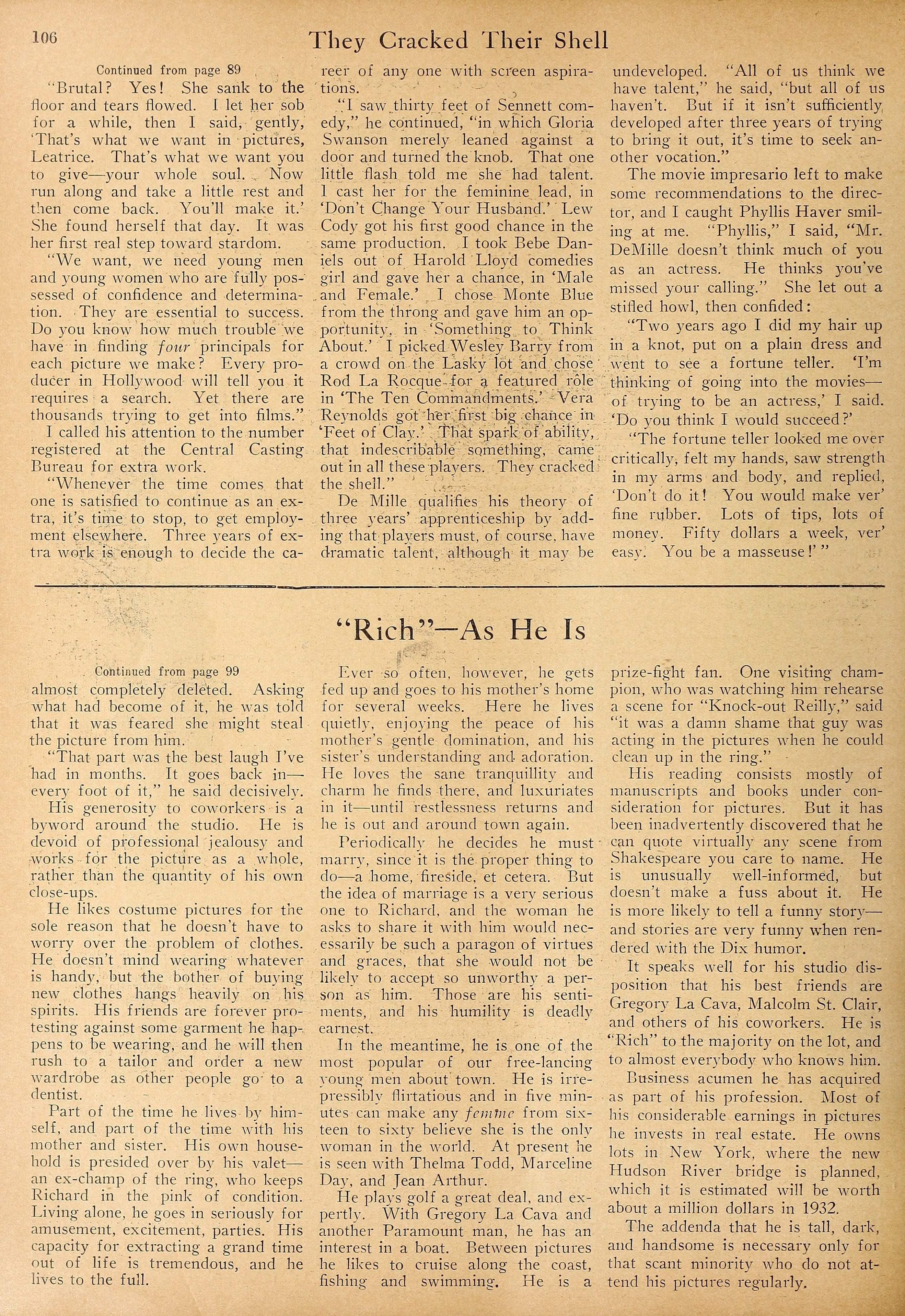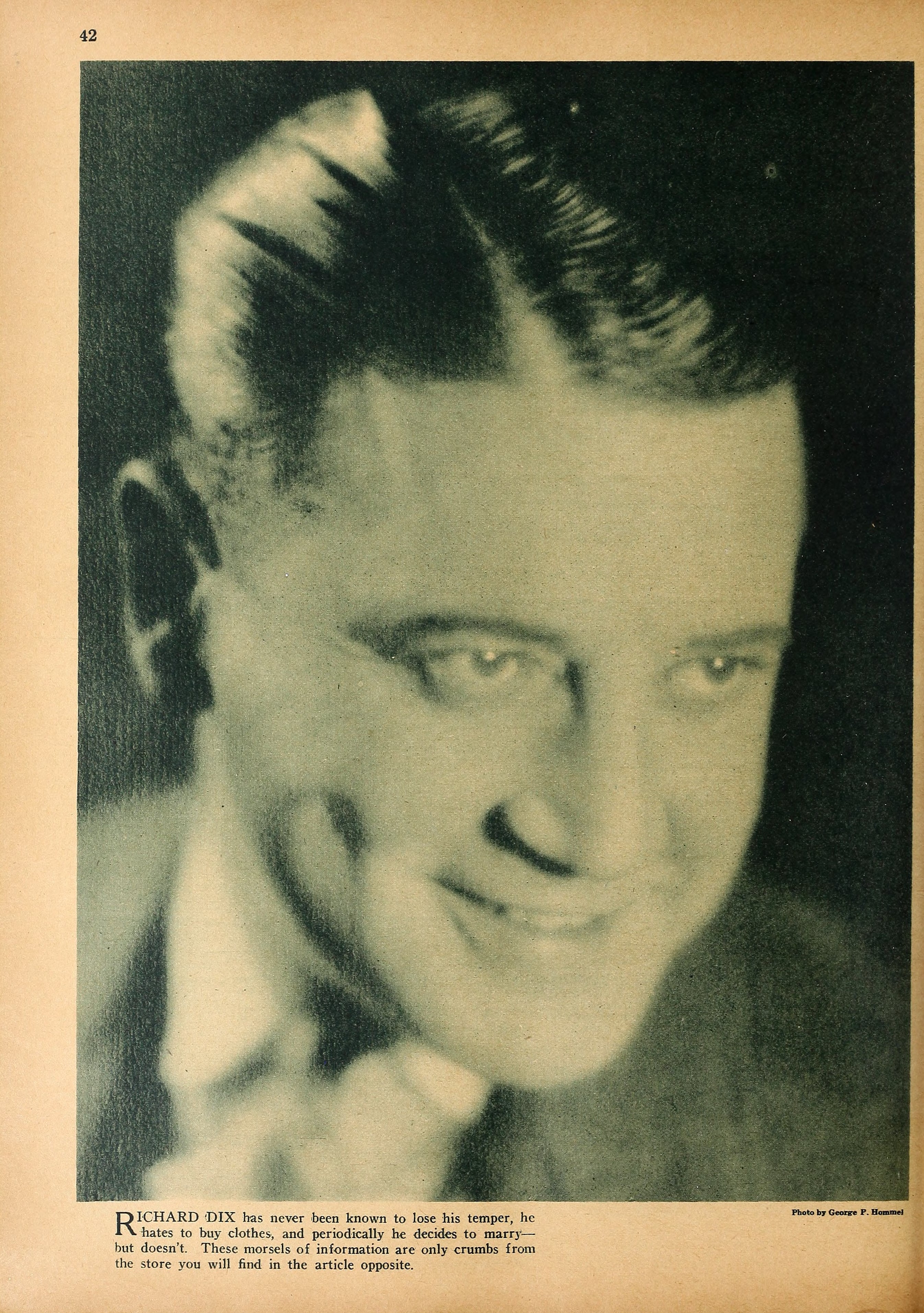Richard Dix — As He Is (1928) 🇺🇸

In this careful appraisal of Richard Dix, his career is followed step by step, and his popularity with coworkers and fans is accounted for.
Richard Dix is a son of the Middle West. Born thirty-four years ago in St. Paul, Minnesota, spending a few years of his childhood in Des Moines, his family returned to Merriam Park, Minnesota. He received his early education there, later graduating from the St. Paul Central High School, and putting in a year or so at the University of Minnesota.
by Margaret Reid
His university career was cut short when he spiritedly abandoned it for the stage.
It had been his father’s wish that Richard become a surgeon. His schooling was conducted with this object in view. From the beginning, however, dramatics and the instinct for them made insidious inroads in his studies. Between football, baseball, and the more earnest business of school plays, he found the hours required for scientific learning increasingly irksome.
The real finish of his surgical ambitions occurred when he watched his brother, a graduate of Johns Hopkins, perform three operations. It was borne upon the youthful Richard that he did not have the strong nerves necessary to a physician. He became, in fact, very sick.
To his family’s dismay, he refused to continue at the university. Taking a job in an architect’s office, he studied dramatic work at night. This led, in turn, to small roles with the Metropolitan stock company, and then to a contract with the Shubert Theater in St. Paul. Here he received fifteen dollars a week. He incurred the wrath of the principals in the company, because his school chums attended religiously and applauded Richard with more enthusiasm than discretion. Feeling, now, that the world was his own vineyard, he set out for New York and bigger things. In the following three years or so, he saw little enough of New York, his brief visits there being the barren periods between engagements in unimportant road companies.
Three years of one-night stands in jerk-water towns put a damper on his ardor. While he had a good time — no misfortune being great enough to lay low the Dix humor — and suffered from no anxiety about his art, he became a misanthrope about his position in the general scheme of things. An unsuccessful actor, with no especial bent for anything else, he was deeply convinced of his complete futility.
During the course of an engagement in a play called The Fourth Estate, he was struck by the significance of a line he had to speak. It was “Somewhere in this world is a place for every man.”
That lie should be speaking this line broke upon him with prophetic solemnity one night, and he was heartened. Two days later the company went on the rocks and Richard was forced to hobo his way back to New York.
Deciding to take a final, desperate chance, he came to Los Angeles and his chain of bad luck was broken. He was engaged as leading-man for the Morosco stock company and for two years-was Los Angeles’ matinee idol, Bunker Bean, The Cinderella Man, and Romance being among his best-remembered plays. At the end of two-years an encouraging offer took him back. to New York, where he put in a strenuous season of appearing in artistic, successes. Which means that he went from one commercial flop to another in embarrassing repetition. Replete with critical appreciation — but rather short on monetary acclaim — he returned to Los Angeles early in 1921. Film officials who attended the Morosco Theater became interested in his possibilities for the screen. It is a well-known tale that Chaplin prophesied Dix would not screen well. Tests, however, proved the contrary and he was signed by First National to do the lead, a dual role, in Not Guilty.
Followed Dangerous Curve Ahead for Goldwyn, which brought him a two-year contract with that organization. During this time, the domestic comedy-dramas he made with Helene Chadwick under Rupert Hughes were conspicuously successful, but his greatest picture was The Christian, his first big dramatic opportunity.
Signing with Paramount in 1923, he served apprenticeship in Zane Grey horse-operas, and an occasional dramatic role. With stardom, he has developed a flair for light comedy and farce that has made him one of the most valuable names on the roster.
Underneath his kidding and levity is an innate sense of responsibility which prompts hard work. With the expert organization he has built around himself — by insisting on giving this assistant director and that third camera man a chance — he works out every detail, rather than contenting himself with a cursory reading of the script. His knowledge of production is very sound.
He is without temperament and has never been known to lose his temper.
He does, however, rebel openly when an effort is made to run his pictures into the channel of starring vehicles, where every situation is draped around the star.
When he looked at the final edition of a picture in which appeared that hilarious comedienne of the stage, Edna May Oliver, he found her role almost completely deleted. Asking what had become of it, he was told that it was feared she might steal the picture from him.
“That part was the best laugh I’ve had in months. It goes back in — every foot of it,” he said decisively.
His generosity to coworkers is a byword around the studio. He is devoid of professional jealousy and works for the picture as a whole, rather than the quantity of his own close-ups.
He likes costume pictures for the sole reason that he doesn’t have to worry over the problem of clothes. He doesn’t mind wearing whatever is handy, but the bother of buying new clothes hangs heavily on his spirits. His friends are forever protesting against some garment he happens to be wearing, and he will then rush to a tailor and order a new wardrobe as other people go to a dentist.
Part of the time he lives by himself, and part of the time with his mother and sister. His own household is presided over by his valet — an ex-champ of the ring, who keeps Richard in the pink of condition. Living alone, he goes in seriously for amusement, excitement, parties. His capacity for extracting a grand time out of life is tremendous, and he lives to the full.
Ever so often, however, he gets fed up and goes to his mother’s home for several weeks. Here he lives quietly, enjoying the peace of his mother’s gentle domination, and his sister’s understanding and adoration. He loves the sane tranquillity and charm he finds there, and luxuriates in it — until restlessness returns and he is out and around town again.
Periodically he decides he must marry, since it is the proper thing to do — a home, fireside, et cetera. But the idea of marriage is a very serious one to Richard, and the woman he asks to share it with him would necessarily be such a paragon of virtues and graces, that she would not be likely to accept so unworthy a person as him. Those are his sentiments, and his humility is deadly earnest.
In the meantime, he is one of the most popular of our free-lancing young men about town. He is irrepressibly flirtatious and in five minutes can make any female from sixteen to sixty believe she is the only woman in the world. At present he is seen with Thelma Todd, Marceline Day, and Jean Arthur.
He plays golf a great deal, and expertly. With Gregory La Cava and another Paramount man, he has an interest in a boat. Between pictures he likes to cruise along the coast, fishing and swimming. He is a prize-fight fan. One visiting champion, who was watching him rehearse a scene for Knock-out Reilly, said “it was a damn shame that guy was acting in the pictures when he could clean up in the ring.”
His reading consists mostly of manuscripts and books under consideration for pictures. But it has been inadvertently discovered that he can quote virtually any scene from Shakespeare you care to name. He is unusually well-informed, but doesn’t make a fuss about it. He is more likely to tell a funny story — and stories are very funny when rendered with the Dix humor.
It speaks well for his studio disposition that his best friends are Gregory La Cava, Malcolm St. Clair, and others of his coworkers. He is “Rich” to the majority on the lot, and to almost everybody who knows him.
Business acumen he has acquired as part of his profession. Most of his considerable earnings in pictures he invests in real estate. He owns lots in New York, where the new Hudson River bridge is planned, which it is estimated will be worth about a million dollars in 1932.
The addenda that he is tall, dark, and handsome is necessary only for that scant minority who do not attend his pictures regularly.

Beneath his levity is a sense of responsibility which prompts hard work.



Richard Dix has never been known to lose his temper, he hates to buy clothes, and periodically he decides to marry — but doesn’t. These morsels of information are only crumbs from the store you will find in the article opposite.
Photo by: George Peter Hommel (1901–1953)
Collection: Picture Play Magazine, June 1928
